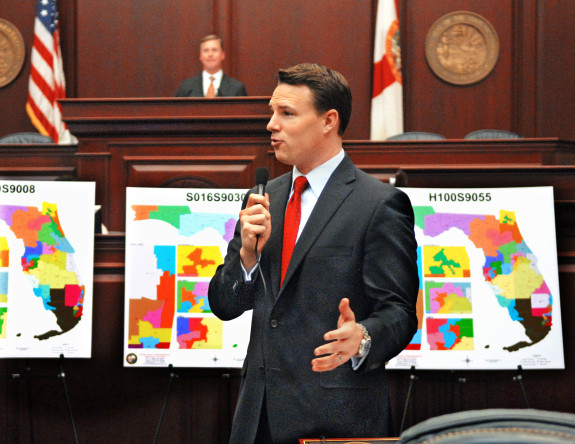
A legal battle over Florida’s redistricting effort heads to a courtroom this week.(Photo via Myfloridahouse.gov)
By Ashley Lopez
Florida Center for Investigative Reporting
An ongoing battle over whether the state’s newest congressional districts were drawn with a partisan bias will continue in a Tallahassee courtroom this week.
Two years ago, the League of Women Voters and a coalition of other voting rights groups filed a lawsuit against the Republican-led Legislature arguing state lawmakers drew the new political maps in a way that gives an electoral edge to the GOP. In 2010, voters in Florida passed the “Fair Districts” constitutional amendment, which mandates that the state draw districts that don’t favor one party over the other. The League argues that lawmakers violated that constitutional amendment.
As The Orlando Sentinel’s Tallahassee Bureau Chief reported, this court battle is about statistics.
…The case could ultimately hinge on the data work that political scientists have done — studying the probability the maps could have been produced without partisan bias, and how similarly draft Republican Party of Florida maps look to the ones the Legislature actually passed.
On the League’s side, political scientists Jowei Chen of the University of Michigan and Jonathan Rodden of Stanford used simulation modeling of redistricting plans to predict how likely it was that Republicans could have drawn such a GOP-leaning map without intentionally leaning on pro-GOP bias.
…They conclude that the Legislature’s map “is an extreme statistical outlier and falls outside the range of partisan bias that could be expected from the non-partisan districting process” called for under the law.
…But the Legislature is turning to Nolan McCarty, political science department chair at Princeton, to refute that analysis.
McCarty notes in a court filing that Chen and Rodden are essentially overstating their results, which is “very misleading in social scientific terms.”
“Chen and Rodden’s simulations are but a model of how a non-partisan districting process might look. It does not and cannot account for all of the factors that real-world mapmakers must consider,” McCarty wrote.
Both sides have also unearthed evidence showing consultants involved in drawing versions of maps designed to tilt elections.
The work of consultants during the time lawmakers were redrawing districts and the money behind that effort plays a very big role here.
As Associated Press reporter Gary Fineout writes in his blog, this case “also threatens to expose the behind-the-scenes relationships that exist between consultants, lobbyists and Florida politicians.”
The plaintiffs allege that GOP consultants played a role in helping craft the maps. One of Cannon’s top aides – and now working with him at a lobbying firm – sent draft maps to a Republican political consultant.
…
But there’s more than just that: Documents and emails produced in connection with the case have highlighted meetings between legislative staff and GOP consultants and even national GOP officials right after the amendments were passed. What has surfaced so far has also raised questions as to the relationships between legislative leaders such as [former house speaker Dean] Cannon and [Senate President Don] Gaetz and well-known Tallahassee consultants Rich Heffley and Marc Reichelderfer. The Naples Daily News pointed out that Heffley for example was paid $10,000 a month as a redistricting consultant while Gaetz was drawing maps for the Senate.
Meanwhile, for those pushing the lawsuits they have had to answer questions about their own motivations since documents have shown that it was Democratic consultants who helped produce a map that was initially submitted to the judge as an alternative to the map now being challenged. In one colorful passage, a consultant talked about wanting “to scoop as many Jews” out of particular neighborhood in order to bolster the district of U.S. Rep. Debbie Wasserman Schultz who is also the chair of the Democratic National Committee.
That’s why it’s no surprise that there’s been an effort by GOP consultants to keep these documents under wraps.
And according to the E.W. Scripps / Tampa Tribune Tallahassee Bureau, the court granted them that cover:
The First District Court of Appeals in Tallahassee has granted a motion filed Thursday by GOP consultants to at least delay the release of 538 pages of documents as part of redistricting trial set to begin Monday.
The motion was filed, in part, by Pat Bainter, owner of Data Targeting, a Gainesville-based Republican consulting firm. Firm employees Matt Mitchell and Michael Sheehan are also included on the motion.
On May 2, Circuit Court Judge Terry Lewis concluded the subject documents could be made public as part of a lawsuit challenging the state’s congressional lines. That deviated from the conclusion of former Supreme Court Justice Major Harding, who was appointed by Lewis as a special master in the case.
The trio from Data Targeting argued that the documents represent “trade secrets,” and are protected by the First Amendment.
“….if the confidential and priviledged information at issue were made public, the non-parties would be hard-pressed to “un-ring the bell” because, once confidential information becomes public, one can do little to make it confidential once more,” read their motion.
The court granted a stay of the release of the documents. It means the trial will begin on Monday as planned, but the 538 documents can’t be presented until the appeals court issues a final ruling.
The trial could last up to 11 days.
